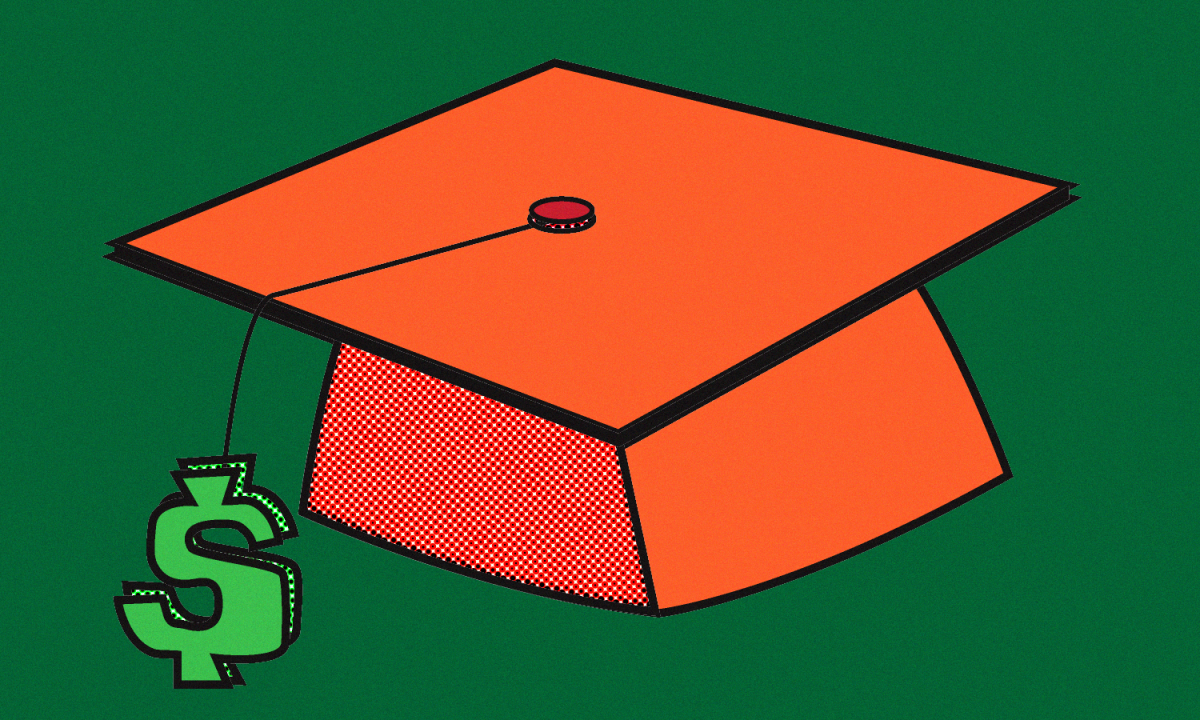Stepping into office in 2020, one of Biden’s most substantial promises was reducing student loan debt. Four years later, it is difficult to say whether Biden was able to create a substantial impact. Even more challenging is determining whether student debt cancellation is beneficial.
Republicans and Democrats stand on opposite sides of this issue. While the effectiveness of this tactic is debatable, there is one fact both parties cannot deny — college tuition and student debt, remain factors crippling the younger generations.
Student debt relief may not be the hero the economy deserves, but ultimately the one it needs.
Increasing Tuition
For non-residents attending the University of Utah, freshmen year boasts a cost of more than $60,000 when factoring in tuition and dorm expenses. If that wasn’t bad enough, prices increased in the 2024-25 school year, with a 3.28% spike in tuition.
Utah is hardly alone in this. College tuition has a long history of steady increases in prices. Nationwide, college as a whole remains largely unaffordable, especially amongst marginalized groups. While avenues towards success outside of the college experience have been increasing, they remain the most revealing factor in lifetime earnings.
While opting out of attending college is an option, it’s not always the best one. It is possible to find greater success without a degree, but for the majority of people, it’s hardly realistic. Blaming students for taking on debt is hardly reasonable despite it statistically being their best option.
The Case Against Student Loans
Opposers of student debt relief arguments also have substantial merit.
Legally, the concept of debt relief has been an uphill battle for the Biden administration. In 2023, the Supreme Court ruled 6-3 against Biden’s student debt relief program.
Economically speaking, student debt relief is regressive in assisting low-income students. Data suggests high-income households hold more debt than their lower-income counterparts. This means debt relief may only serve to widen the wealth inequality gap.
Although supporters of debt relief have worked to address this issue, it remains a prevalent aspect in the fight for debt relief. After all, individuals choose to take on debt to attend college. Demanding others help repay those loans appears unreasonable at first glance.
The Essence of Fairness
Blaming the individual for their poor economic decisions regarding loans may be morally logical, but it is unsustainable.
As of September 2023, borrowers owed upwards of $1.7 trillion. Many individuals feel it is not the government’s responsibility to assist in relieving this debt. Regardless, the negative impacts this has on the economy is undeniable.
A large portion of borrowers are under 40 years of age and represent the country’s most active contributors in the workforce. Leaving these individuals to fend for themselves not only hurts them but everyone collectively.
It is not a suitable argument for those who have managed to pay off their debts to claim it is unfair to relieve others of their financial burdens.
Financial debt is directly correlated to mental health struggles and an inability to reach important life milestones. Suggesting younger generations ought to deal with debt simply because their predecessors did is nothing short of closed-mindedness.
The Best Answer for Now
It is hard to argue student debt relief by itself is a cure-all for the financial struggles many Americans currently find themselves in. While it’s tempting to view any debt relief as beneficial, it is important to remember the repercussions of thoughtless loan forgiveness. That said, it is not an issue that can be ignored.
It remains true that college is beneficial to most students, and in turn necessary for some to take on risky loans. Debt relief is merely a band-aid on a system that overcharges its constituents in return for the promise of future success, success that cannot be guaranteed. Despite this, it is the only remedy currently at the country’s disposal to combat this issue.
Until the system changes to offer the benefits of college at a universally affordable rate, debt relief cannot be written off as an unrealistic decision.





Dominic • Sep 4, 2024 at 4:54 pm
Let us not forget the main reason student debt is an issue in the first place is the Republican party’s (the same party now ruling 6-3 to uphold this system) sweeping changes under the Reagan administration to cut higher education funding. Ironic how they create the problem then sell us the solution via loan repayments, isn’t it?
Cindy Solomon-Klebba • Sep 4, 2024 at 1:17 pm
Tax-payers will “bail out” students one way or another. The inability to afford adequate housing, the impact that has on healthcare (also unaffordable for many outside an emergency room,) etc. All of those things are covered by taxpayers. Helping alleviate student debt is far less costly in the long run.
There are good reasons to attend out-of-state colleges. Finding the program that matches your career goals will sometimes necessitate leaving home.
The issue here is not the “irresponsible” choices of individual students. Rather, it is a broken system that preys on vulnerable students encouraged to go to school to get a good job that is supposed to then afford them the ability to repay those loans. But the system is rigged NOT to allow those repayments to actually pay off the debt. The interest structure keeps people in debt far longer than it should.
When young people cannot gain the wealth for homeownership (as one of the most obvious examples) the economy as a whole suffers.
There are more studies than I can count on how this system is broken, how it keeps people in debt, how loan forgiveness benefits us all, etc.
The larger issue here is that we have failed students not only in terms of the economics of college but in more important ways that are far more troublesome.
We have grown into a society where “I got mine, who cares about yours” is the common theme of the day. (Yes, historically, we can argue this has existed for centuries, but really, it seems worse now.)
YOU will be better of if your neighbor can afford healthcare. YOU will be better off if all kids get a decent education. YOU will be better off if the person down the street can access mental health care. YOU will be better off when others have the same opportunities that you do. You will be better off when others are better off.
If we want to tackle student debt we must do so economically. But we will be no better off as a society if we do not tackle the deeper societal deficit: the lack of empathy and care for our fellow humans that we seem so lacking.
I have paid off more than 100K in student loans. I would gladly pay taxes to help others pay their off. Because then we are ALL better off.
Cindy SK
Darrin • Aug 31, 2024 at 7:39 am
Why should taxpayers bail out students for their poor decisions. You noted that tuition at the University of Utah is $60,000 for out-of-state students. So you know what you do you don’t go to an out-of-state school that’s charging three times as much for out-of-state students. Choose a school in your own state.